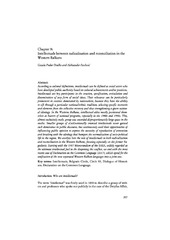Приказ основних података о документу
Intellectuals between radicalization and reconciliation in the Western Balkans
| dc.contributor | Meka, Eltion | |
| dc.contributor | Bianchini, Stefano | |
| dc.creator | Pudar Draško, Gazela | |
| dc.creator | Pavlović, Aleksandar | |
| dc.date.accessioned | 2021-11-22T11:41:20Z | |
| dc.date.available | 2021-11-22T11:41:20Z | |
| dc.date.issued | 2020 | |
| dc.identifier.isbn | print 978-3-8487-6904-9 | |
| dc.identifier.isbn | online 978-3-7489-21516 | |
| dc.identifier.uri | http://rifdt.instifdt.bg.ac.rs/123456789/2457 | |
| dc.description.abstract | According to cultural definitions, intellectuals can be defined as social actors who have developed public authority based on cultural achievements and/or positions. Intellectuals are key participants in the creation, specification, articulation and dissemination of any form of social ideas. Their relevance can be particularly prominent in societies dominated by nationalism, because they have the ability to sift through a particular national/ethnic tradition, selecting specific moments and elements from the collective memory and thus strengthening a given national ideology. In the Westerns Balkans, intellectual elites mostly positioned themselves as bearers of national programs, especially in the 1980s and 1990s. This, almost exclusively male, group was awarded disproportionately large space in the media. Smaller groups of a(nti)nationally oriented intellectuals never gained such dominance in public discourse, but continuously used their opportunities of influencing public opinion to express the necessity of repudiation of extremism and breaking with the ideology that hampers the normalization of socio-political life in the region. We analyze here the role of intellectuals to both radicalization and reconciliation in the Western Balkans, focusing especially on the former Yugoslavia. Starting with the 1987 Memorandum of the SASA, widely regarded as the ultimate intellectual fuel to the deepening the conflict, we end with the most recent case of Declaration on the Common Language (2017), which opted for the unification of the now separated Western Balkan languages into a joint one. | sr |
| dc.language.iso | en | sr |
| dc.publisher | Nomos Verlagsgesellschaft | sr |
| dc.relation | info:eu-repo/grantAgreement/MESTD/inst-2020/200025/RS// | sr |
| dc.rights | openAccess | sr |
| dc.rights.uri | https://creativecommons.org/licenses/by/4.0/ | |
| dc.source | The Challenges of Democratization and Reconciliation in the Post-Yugoslav Space | sr |
| dc.subject | Intellectuals | sr |
| dc.subject | Yugoslavia | sr |
| dc.subject | Belgrade Circle | sr |
| dc.subject | Memoranda | sr |
| dc.subject | Circle 99 | sr |
| dc.subject | Dialogue of Historians | sr |
| dc.subject | Declaration on the Common Languag | sr |
| dc.title | Intellectuals between radicalization and reconciliation in the Western Balkans | sr |
| dc.type | bookPart | sr |
| dc.rights.license | BY-NC-ND | sr |
| dc.type.version | publishedVersion | sr |
| dc.identifier.fulltext | http://rifdt.instifdt.bg.ac.rs/bitstream/id/12491/bitstream_12491.pdf | |
| dc.identifier.rcub | https://hdl.handle.net/21.15107/rcub_rifdt_2457 |

